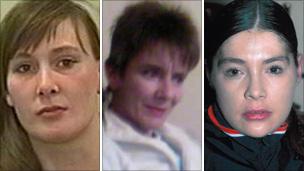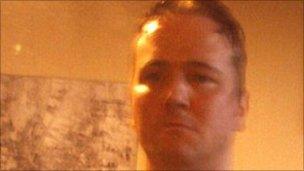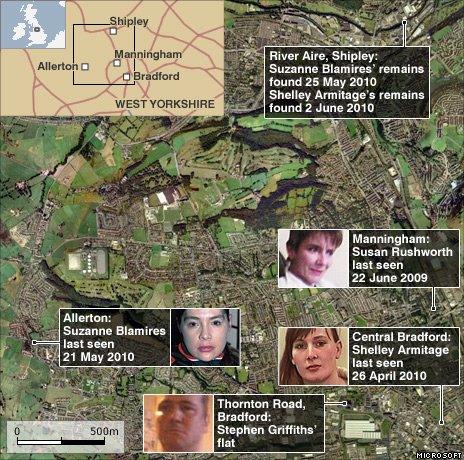CCTV sparked 'thorough and painstaking' inquiry
- Published

Griffiths was charged with murdering Shelley Armitage, Susan Rushworth and Suzanne Blamires
As the caretaker in Bradford's Holmfield Court started reviewing CCTV tapes of the previous weekend, nothing could have prepared him for what he was about to see.
The footage showed Suzanne Blamires running from Stephen Griffiths' third-floor flat.
Griffiths is seen chasing after her and attacking her, before dragging her back to the flat, where he is seen standing over her.
This recording of the final moments of Ms Blamires' life led West Yorkshire Police to Stephen Griffiths and the discovery of the serial killer's other horrific crimes.
Armed officers and forensic teams swooped on his flat on 24 May after being contacted by the stunned caretaker, and 40-year-old Griffiths was arrested.
As an extensive search operation swung into place, the sheer scale of Griffiths' offending began to emerge, and the force's "thorough and painstaking" investigation gathered in both pace and scope.
'Crossbow injuries'
Divers scoured the River Aire and on 25 May the remains of Ms Blamires were recovered from the water near Shipley.
Ms Blamires, a sex worker, who had serious drugs and alcohol problems, had been missing for four days.

Searches took place at more than 100 locations across Bradford
An inquest later found the 36-year-old had died as a result of injuries caused by a crossbow bolt.
On 27 May Griffiths was charged with the murder of Ms Blamires.
Police had also been investigating the disappearance of two other Bradford women, Shelley Armitage and Susan Rushworth and charged him with all three murders.
By this stage dozens of police teams had started searching more than 100 sites across Bradford.
Items from Griffiths' flat were removed from the property using wheelbarrows and nearby drains were examined.
Human tissue
The area around the converted mill building was cordoned off, fingertip searches were carried out and sniffer dogs were drafted in as the hunt for Shelley Armitage and Susan Rushworth continued.
Streets and alleyways were sealed off and detectives could be seen taking a large number of objects away in plastic bags.
Officers also began searching the city's Lister Park, about one mile from Griffiths' home, and CCTV footage recovered from Holmfield Court continued to be examined.
On 28 May Griffiths appeared at Bradford Crown Court charged with murdering the three women.

Stephen Griffiths identified himself as "the crossbow cannibal" at his first court appearance
Griffiths, a Bradford University psychology graduate who was researching 19th Century murders in the city as part of his PhD thesis, shocked the public gallery when he identified himself as "the crossbow cannibal".
The police inquiry continued in earnest and on 29 May further remains were recovered from the River Aire. A large suitcase containing tools was also found.
Police later confirmed the remains were animal, however on 2 June extensive tests on "a small piece of human tissue" also retrieved from the river found it belonged to Shelley Armitage.
Ms Armitage, 31, had been missing since 26 April.
Attempt on life
Ms Rushworth, a 43-year-old grandmother from Bradford, has never been found.
During his time on remand at HMP Wakefield, Griffiths was placed under 24-hour watch after trying to suffocate himself.
In a separate incident he suffered "superficial wounds" after cutting himself in the jail.
At its height the investigation involved more than 130 people, including 60 detectives and 70 specialist search officers.
The river searches continued until the end of June.
The three women had all worked as prostitutes in Bradford. West Yorkshire Police said the case had come as "a huge shock" to its vice team.
Supt Angela Williams said at the time: "It's easy to forget that every woman involved in prostitution didn't start out that way.
"They all have families, personal stories and often personal tragedies which have led them to where they are today."

- Published2 June 2010
- Published28 May 2010
- Published27 May 2010